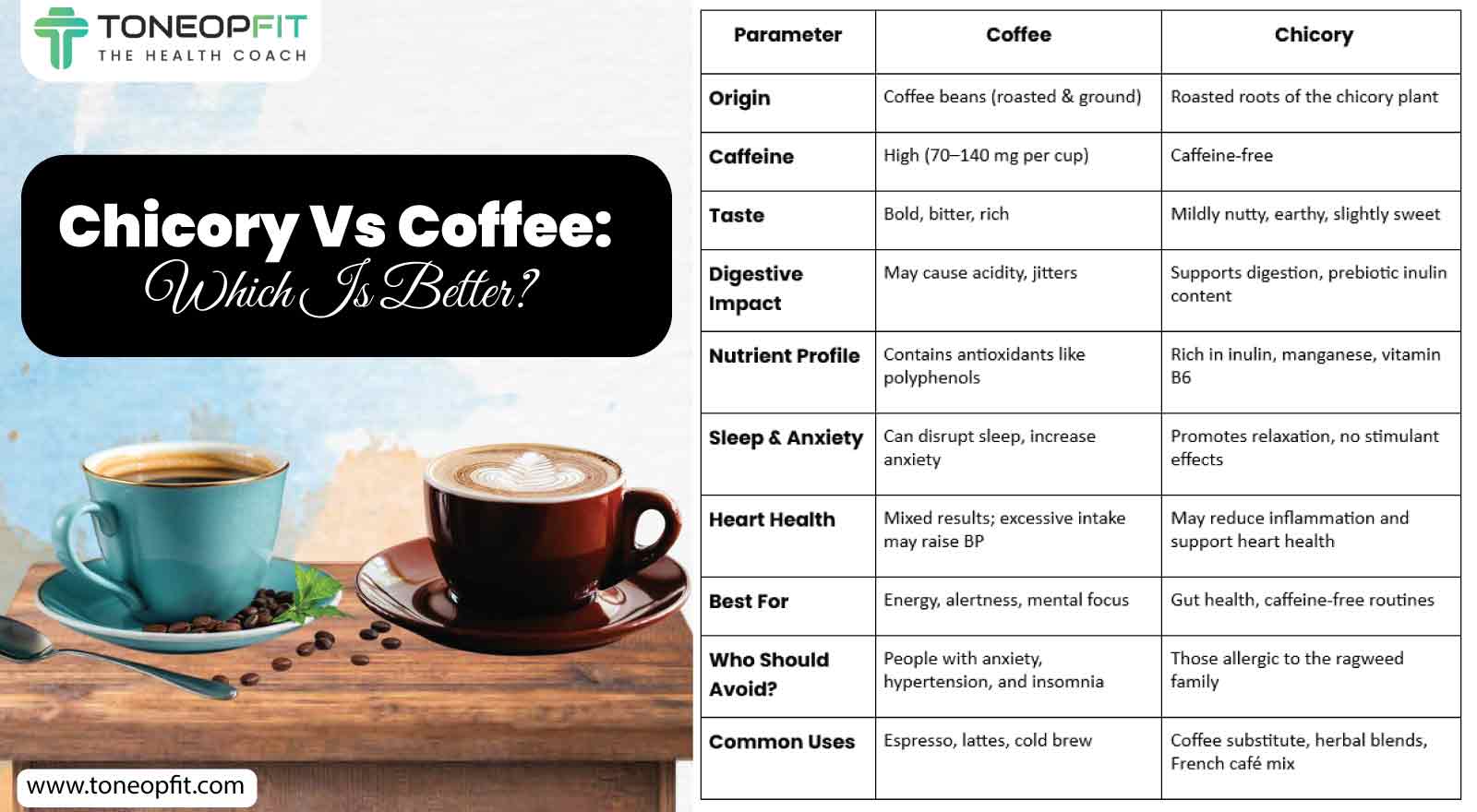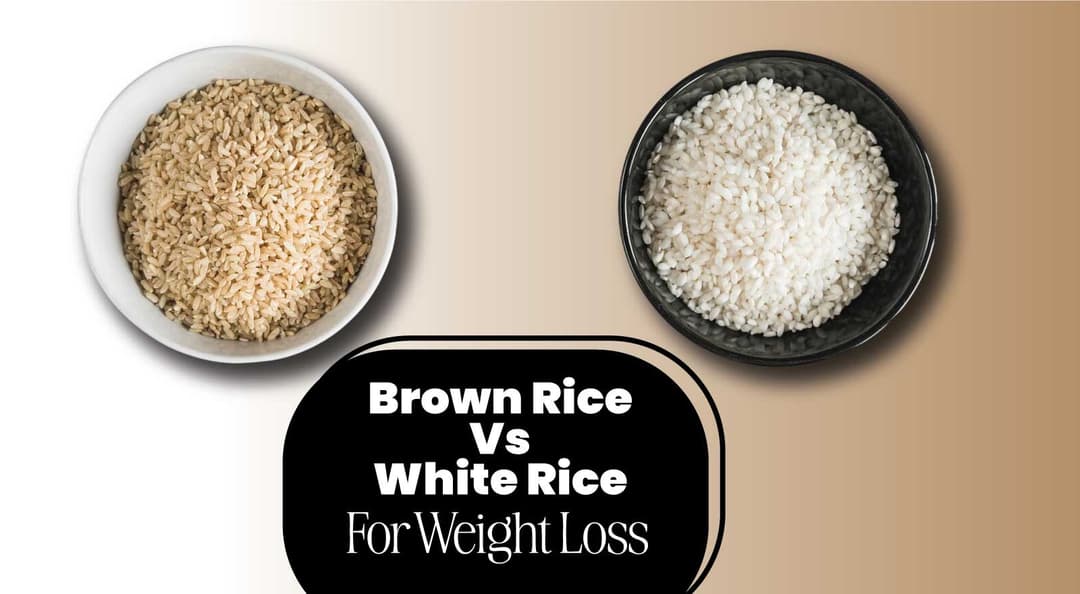We all love our daily cup of coffee. It gives us that much-needed jolt of energy to kickstart the day. But what if there were a gentler, caffeine-free alternative that also offers health benefits? That’s where chicory coffee enters the picture. The age-old debate of chicory vs coffee is gaining traction again, especially among health-conscious individuals and those looking for alternatives to reduce caffeine intake.
In this blog, we’ll break down the chicory vs coffee debate by comparing their caffeine content, flavour, and health benefits. We’ll also look at who should avoid chicory and what potential side effects it may have. Whether you're an avid coffee drinker or simply looking for a natural way to improve your health, this guide will help you make an informed choice.
Table Of Contents
- Is Chicory Better Than Coffee?
- Chicory vs Coffee — Health Benefits
- Who Should Not Drink Chicory: What Are the Disadvantages of Chicory?
- Dietitian’s Recommendation
- The Final Say
- FAQs
- References
Is Chicory Better Than Coffee?
Yes, chicory, a caffeine-free alternative, can be a great option for people who want to cut down on caffeine or enjoy a similar-tasting beverage without the jitters. Chicory coffee has a nutty and woody aroma. It’s brewed using roasted chicory root instead of coffee beans and has become a popular substitute for regular coffee, particularly for those aiming to reduce caffeine.
Regular coffee is made by roasting, grinding, and brewing coffee beans. It typically contains about 92 mg of caffeine per cup. While moderate caffeine can be beneficial, too much may cause anxiety, heart palpitations, nausea, sleeplessness, and restlessness.
In contrast, chicory root coffee is naturally caffeine-free, making it a wonderful alternative for people sensitive to caffeine or those following a summer workout plan at home who want to avoid dehydration from caffeinated drinks.
Some people enjoy a blend of chicory and coffee, while others drink only chicory coffee.
Chicory vs Coffee — Health Benefits

In this section, we will first look at the individual benefits of chicory and coffee, and then we’ll compare their caffeine content and flavour.
Chicory Benefits
1. Reduces Anxiety
Chicory has been shown to reduce anxiety by calming the nervous system. Studies suggest it can alleviate inflammation linked to neurological issues. Since sleep affects anxiety levels, chicory’s calming effects can promote better rest, a helpful tip for those following foods to avoid in hot weather routines.
2. Strengthens the Heart
Chicory root is rich in inulin, which helps remove bad cholesterol (LDL) from the body. This can lower the risk of heart attacks or strokes. Drinking roasted chicory seed powder with milk may support cardiovascular health.
3. Detoxes the Liver
Chicory has been used traditionally for liver detoxification. Modern research also shows it helps reduce oxidative stress and liver damage, making it a supportive drink for those exploring remedies to remove stomach fat in 7 days.
4. Aids Weight Loss
The inulin and oligofructose in chicory promote satiety without raising blood sugar. They also encourage the growth of good gut bacteria, helping balance digestion and support weight management. This is especially helpful for those on an 800-calorie diet plan for weight loss.
5. Relieves Constipation
Chicory roots are rich in inulin and essential vitamins like C, K, and beta-carotene. Together, these nutrients help relieve intestinal issues like constipation.
Also Read: The Shocking Difference Between Curd And Greek Yoghurt: Which Is Better For Your Health?
Coffee Benefits
1. Rich in Antioxidants
Coffee is packed with antioxidants, especially green coffee beans. These antioxidants, like polyphenols, protect cells from damage and boost overall health.
2. Boosts Brain Function
Caffeine in coffee activates the body and improves memory, focus, and energy. For those working on mental performance or a pre-workout weight loss drinks routine, coffee can be a powerful ally.
3. Eases Headaches
Caffeine acts as a vasodilator, helping reduce blood pressure and ease headaches. But moderation is key—excessive caffeine may worsen migraines.
4. Enhances Physical Performance
Athletes and fitness lovers benefit from coffee’s energy boost. It helps fight fatigue and improve focus, making it ideal for a summer workout plan at home.
5. Supports Weight Loss
Caffeine boosts thermogenesis, the process by which the body burns fat. Black coffee, in particular, supports fat metabolism more effectively than milk-based versions.
For those exploring foods to increase stamina for running, coffee is often included in performance-boosting diets.
Caffeine Content
One of the key differentiators in the chicory vs coffee discussion is caffeine content. Chicory coffee is naturally caffeine-free. That makes it ideal for evening consumption, as it doesn't disrupt sleep or contribute to caffeine-related issues. It offers natural energy without overstimulating your system.
Coffee, on the other hand, is popular for its high caffeine content. While it provides an instant energy boost, it can also cause an increased heart rate or anxiety, especially in sensitive individuals.
Flavour Comparison
The flavour profiles of chicory vs coffee are distinct. Chicory coffee has an earthy, woody taste with a subtle natural sweetness. It pairs well with milk or can be enjoyed black. The flavour is unique and often appreciated by those who like bold beverages.
Regular coffee offers a broader range of tastes—bitter, sweet, fruity, smoky—depending on the roast and origin. Coffee’s variety in flavour makes it a more versatile drink for different palates.
For those following a diet plan for weight loss in summer, opting for caffeine-free chicory coffee might help with hydration and digestion.
Also Read: Muskmelon Vs Cantaloupe: Comparing Benefits & Nutritional Differences For A Healthier Choice
Who Should Not Drink Chicory: What Are the Disadvantages of Chicory?
While chicory is healthy, it’s not suitable for everyone. Here are a few considerations in the chicory vs coffee comparison:
1. Allergies
Chicory can provoke allergic reactions, particularly in individuals sensitive to ragweed or birch pollen. Such cross-reactivity may manifest as oral allergy syndrome, with symptoms including itching or swelling in the mouth and throat, skin rashes, respiratory issues, or gastrointestinal discomfort. Those with a known pollen allergy should exercise caution and consult an allergist if symptoms arise.
2. Pregnancy and Breastfeeding
The safety of chicory during pregnancy and breastfeeding remains insufficiently researched. While some sources suggest moderate consumption may be safe, others caution that excessive intake could stimulate uterine contractions, potentially increasing the risk of miscarriage or premature labour. Due to these uncertainties, it is prudent for pregnant or breastfeeding individuals to consult their healthcare provider before including chicory in their diet.
As an alternative, the benefits of ginger tea for pregnant women might be a better choice.
3. Gallstones
Chicory may exacerbate gallstone-related issues. Its effect on bile production and flow could potentially worsen symptoms in individuals with gallstones. Those with a history of gallbladder disease should seek medical advice before consuming chicory products.
4. Diabetes
Chicory has demonstrated blood glucose-lowering properties, which may benefit some individuals with diabetes. However, regular use could interact with existing diabetes medications or disrupt blood sugar control. Diabetic patients should consult their physician to determine appropriate use and monitor their blood glucose levels closely when introducing chicory into their regimen.
5. Irritable Bowel Syndrome (IBS)
Chicory contains inulin, a type of prebiotic fibre that can cause gastrointestinal symptoms such as bloating, gas, or abdominal discomfort in individuals with IBS. Those with a sensitive digestive system should introduce chicory cautiously and monitor for adverse effects.
People exploring how to manage their appetite naturally may also consider reading our guide on how to control hunger pangs.
Also Read: Rock Salt Vs Normal Salt: Which Is Better? The Big Difference That Could Change Your Diet!
Dietitian’s Recommendation
When deciding between chicory coffee and conventional coffee, consider your own needs and preferences. By embracing the diversity of options offered, you may benefit from a personalised coffee experience that takes into account your health and taste preferences. You may also incorporate chicory into your normal coffee and take up to 1 to 2 cups each day to get benefits. Remember that the ideal coffee substitute is one that you enjoy drinking and that promotes your well-being in the most satisfying way.
Dt. Lavina Chauhan
The Final Say
The chicory vs coffee conversation doesn’t have a one-size-fits-all answer. Chicory offers a caffeine-free, gut-friendly alternative that supports heart, liver, and digestive health. Coffee, on the other hand, energises, boosts brain function, and contains powerful antioxidants. Depending on your health goals—whether it's better sleep, reduced anxiety, or improved performance—both drinks have something valuable to offer. Explore what suits your body best, and feel free to switch between the two depending on your mood and needs.
If you're on a wellness journey and want to try new additions to your diet, this comparison gives you the full picture of chicory vs coffee—so you can sip smarter every day.
FAQs
1. Is drinking chicory coffee healthy?
Drinking chicory coffee can be a healthy choice for many, as it is caffeine-free, rich in fibre, and supports digestive and liver health, but it may not suit everyone, especially those with allergies or certain medical conditions. Always consult your doctor if you have specific health concerns.
2. Is chicory good for fatty liver?
Chicory shows promise in supporting liver health and may help improve liver function and reduce risk factors in non-alcoholic fatty liver disease, according to recent clinical studies. However, more long-term research is needed before widespread recommendations can be made.
3. Does chicory stain teeth?
Chicory is much less likely to stain teeth than coffee, as it contains little to no tannins and is less acidic, making it a gentler option for your enamel. Still, with frequent consumption, some mild discolouration may occur over time.
4. Does chicory keep you awake?
Chicory does not keep you awake, as it is naturally caffeine-free and even has mild sedative properties that may help you relax or sleep better. It’s a suitable option if you want a warm beverage without the stimulating effects of coffee.
References
- https://www.thehealthsite.com/hindi/herbs/chicory-benefits-uses-sideeffects-in-hindi-874948/
- https://www.lybrate.com/topic/chicory-kasni-benefits-and-side-effects-in-hindi/379c5b2ad59faa333c402e153495e39e
- https://www.webmd.com/vitamins/ai/ingredientmono-92/chicory
- https://www.finehomesandliving.com/featured/coffee-vs-chicory-know-the-difference/article_b2c9f388-9dd9-11ed-adad-0b08e145dc91.html
- https://www.kamana.co/blogs/coffee-alternative/chicory-coffee-vs-regular-coffee-key-differences-and-health-benefits-compared?srsltid=AfmBOoqUbQ0wbizL2fzd9fZ4SkaxVoYryJysb-cEAF56FtSDJ0Z_tJGi
- https://www.nescafe.com/in/coffee-culture/knowledge/coffee-benefits
- https://www.onlymyhealth.com/healthy-alternative-for-coffee-chicory-health-benefits-in-hindi-1696504632
- https://www.thehealthsite.com/fitness/diet/4-reasons-why-chicory-coffee-is-a-better-alternative-to-regular-coffee-917043/
About ToneOp Fit
ToneOp Fit is a platform dedicated to improving and maintaining good health through a comprehensive range of goal-oriented health plans with up to 3 Coach support. With a range of Weight Management, Medical Condition, Detox Plans, and Face Yoga Plans, the app also provides premium health trackers, recipes and health content. Get customised diet, fitness, naturopathy & yoga plans and transform yourself with ToneOp.








































